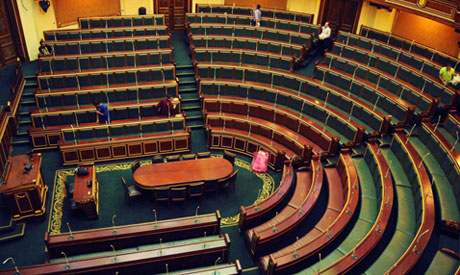 Wednesday's Administrative Court decision throwing President Mohamed Morsi's call for April parliamentary polls into doubt prompted diverse reactions from Egyptian political figures.
Wednesday's Administrative Court decision throwing President Mohamed Morsi's call for April parliamentary polls into doubt prompted diverse reactions from Egyptian political figures.
Hours after the court decision, presidential advisor Mohamed Gadalla told Reuters that the presidential decree by which Morsi called the elections was "sovereign" and could not be overturned by court order.
Muslim Brotherhood lawyer Abdel-Moneim Abdel-Maqsoud agreed with Gadalla. He argued that the administrative court's decision conflicted with judiciary principles, likewise stressing the "sovereign" nature of elections-related presidential decrees.
"According to the law, the verdict can be appealed," Abdel-Maqsoud told Al-Ahram's Arabic-language news website. "We're expecting it to be overturned."
Media consultant for the Brotherhood's Freedom and Justice Party Mourad Ali, however, stated on Twitter that it was "unlikely" that his party would appeal the verdict. "We respect court rulings and don't have a problem with referring the law to the High Constitutional Court," he said.
On 18 February, the High Constitutional Court (HCC) rejected five articles of a new elections law that will govern Egypt's second post-revolution parliamentary polls. The law was then sent back to the Shura Council (the upper house of Egypt's parliament, currently endowed with legislative authority) for amendment.
The Shura Council partially amended the legislation, but without referring it back to the HCC for final approval.
According to Wednesday's Administrative Court ruling, the Shura Council should have referred the law back to the HCC before ratifying it so as to ensure the constitutionality of the recent amendments.
Reactions vary
Abdallah Badran, head of the Salafist Nour Party's parliamentary bloc, hailed Wednesday's court ruling, stressing that his party had earlier demanded such a move.
Badran reiterated his party's fears that elections would take place without full HCC approval of the law governing them, thus exposing the incoming parliament to potential dissolution by court order – as was the fate of Egypt's first post-revolution parliament.
"The Nour Party is willing to discuss the law again in the Shura Council, look into the articles the HCC wants amended and refer them back to the HCC for final approval so as to avoid seeing parliament dissolved as it was last year," said Badran.
Egypt's last People's Assembly (the lower house of parliament) was dissolved last summer by the then-ruling military council following an HCC verdict deeming the law that regulated it unconstitutional.
Bahaa Abu-Shaqa, a prominent lawyer and member of the liberal Wafd Party, similarly defended Wednesday's court verdict. He argued that the president's decree calling for the polls was not sovereign as claimed, but simply represented an administrative decision.
"The court has the right to suspend the presidential decree if it finds it to be flawed," he said. "I urge everyone to respect court verdicts and only appeal them through legal channels."
Former Administrative Court head Mohamed El-Gamal likewise defended the verdict, which, he said, followed the Shura Council's failure to abide by the HCC's demand to amend certain articles of the elections law.
"The Shura Council only made superficial changes [to the electoral law] and the constitutionality of those amendments was never confirmed," he said. "The Administrative Court ruled to refer the law to the HCC to allow the latter to perform its role of establishing the constitutionality of elections-related legislation."
He added that the court decision "does not overstep sovereign presidential decisions, as elections-related decrees aren't considered sovereign."
Based on the ruling, according to El-Gamal, Egypt's Supreme Elections Commission (mandated with organising the polls) "should suspend its work" until a final decision is issued by the Administrative Court following the expected appeal.
Several members of the opposition National Salvation Front (NSF) umbrella group, meanwhile, which had earlier declared its intention to boycott the polls on legal grounds, saw the verdict as a vindication of their position. NSF members, however, appeared to disagree as to whether or not the verdict would mean a change in the NSF's official stance on elections.
One member of the liberal Free Egyptians Party, a sub-grouping within the NSF, saw the verdict merely as a justification of the NSF's boycott calls. Other NSF leaders, however, including Conference Party chief Amr Mousa and leading Tagammu Party member Rifaat El-Said, saw the verdict as a step towards meeting the NSF's conditions for participating in the upcoming polls, Al-Ahram's Arabic-language news website reported.
Hopes for consensus
Wafd Party member Abdallah Moghazy, for his part, told the same website that the court verdict could serve to jumpstart serious dialogue between the presidency and opposition aimed at breaking the political deadlock.
"The presidency was using the 'lack of time' as an excuse not to replace the current government with a new one [a primary demand of the NSF]," said Moghazy. "But now, with the court verdict, it has all the time it needs; it has no excuse. A change of government could prompt opposition parties to reconsider taking part in elections."
The opposition had demanded certain guarantees that polls would be fair and transparent, including the formation of a national unity government and the dismissal of Egypt's Morsi-appointed prosecutor-general. Some opposition parties have also expressed reservations about the new elections law, which, they assert, only benefits the majority party.
The presidency, for its part, stressed via Twitter its "respect for the Administrative Court ruling to suspend elections for parliament's lower house and refer the elections law back to the constitutional court." It went on to reaffirm "its respect for [Egypt's] constitution, the rule of law and the separation of powers."



